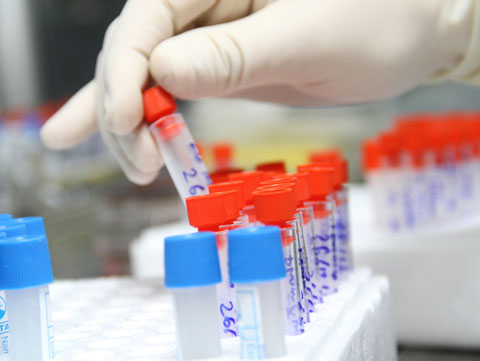Decoding the Vietnamese gene to improve the race
By reading human genes, it is possible to find good genes to improve the species, while also helping to detect, diagnose and treat susceptible diseases of people who read the gene.
Treating diseases, discovering talents
The Ministry of Science and Technology has just worked with the Institute of Science and Technology on the feasibility of sequencing and sequencing Vietnamese people.
Prof. Dr. Nong Van Hai, Deputy Director of the Institute of Biotechnology said: Until now, scientists, genetic research experts of the Institute of Biotechnology have decoded 16,000 mitochondrial genes of 9 individuals. belongs to 3 ethnic groups of Kinh, Tay and Muong and builds an initial database of Vietnamese gene sequencing system.
Decoding the genome not only helps to detect, diagnose and treat diseases, but also find good genes to improve the race.
Prof. Dr. Nong Van Hai also said that the research results from the projects and programs show that the races and individuals are 99.9% alike and only differ in a very small percentage ( 0.1%) of genome structure.
However, this very small difference is of decisive significance for the ethnological and health characteristics of an entire nation; is the genetic factor related to the health of each individual.
"The decoding and comparison of all exome genes of some people with diseases such as genetic diseases, cancer, diabetes, cardiovascular disease . in Vietnam help detect the fecal markers. death for diagnosis and treatment.
In addition, decoding the genome of individuals with good health, longevity (over 100 years old), special talents in sports, math, music, science, management . will Searching for relevant genes to improve the race, " said Prof. Dr. Nong Van Hai.

Genetic decoding helps to select good genes to improve the race.
It is not possible to conclude the general characteristics of Vietnamese genes
Prof. Dr. Truong Nam Hai, Director of the Institute of Biotechnology, said that in biological research, sometimes the genome is not much different, but the strong and weak expression in which side is due to the living environment.
For example, with 1,000 genes, all 1,000 genes do not always show up, but sometimes only 150 genes, sometimes expressing only 100 genes . The number of genes expressed depends on the environment and work. How do those genes work together?
Showing only in a certain state in the gene, the expression will be different from the state in which 150 genes are expressed. That other is due to the decision. The condition will determine what genes are expressed at that time.
For example, a person in Vietnam who does a certain job in the country but when going abroad in another living condition, another law . that person will be able to show that it is suitable for external conditions. . The external environment is how the genes inside express, which are two intimate relations.
Therefore, the characteristics of Eastern or Western people are just the expression of different genes rather than genetic differences.
Currently, the Institute of Biotechnology has finished studying the mitochondrial genome of 54 ethnic groups of Vietnam. It was the first study in Vietnam about the Vietnamese genome.
However, Assoc. Prof. Dr. Truong Nam Hai also said that domestic research on Vietnamese genes is not much and not yet systematic, so it is not yet possible to say the general characteristics of Vietnamese genes.
In the world, they have to study the whole genome beforehand to come up with common characteristics. After studying decoding human genes, it was discovered that there are some genetic changes, it also depends on each race. These differences are related to a number of diseases, which in this race are more common in other races.
"In order to understand the characteristics of the Vietnamese genome, the target is oriented towards 2020, if it is adequately invested and rushed, there will be an answer for about 4.5 years. For equipment is about 20-30 million USD, then investment in chemical equipment, supplies and people, " said Associate Prof. Dr. Truong Nam Hai.
- Detection of genes associated with crime
- Decode cheap DNA
- Decoding the world's longest-lived human gene
- Vietnam first deciphered the rice genome for the first time
- Decoding the gene sequence of pancreatic cancer
- The first successful decoding of the tomato genome
- US science successfully decodes the genome of wheat
- Scientists decipher the sequence of pear genes
- The first successful decoding of the wheat genome structure
- Vingroup spent money on 1,000 Vietnamese genome sequences
- Decode the 115-year-old woman's genome
- Successfully decode the genome of orange and tangerine plants
 Why do potatoes have eyes?
Why do potatoes have eyes? 'Tragedy' the world's largest carnivorous life: Death becomes ... public toilet
'Tragedy' the world's largest carnivorous life: Death becomes ... public toilet Tomatoes were once considered 'poisonous' for 200 years
Tomatoes were once considered 'poisonous' for 200 years Detecting microscopic parasites on human face
Detecting microscopic parasites on human face Tomatoes will be sweeter and juicier thanks to new technique
Tomatoes will be sweeter and juicier thanks to new technique  Discovered many types of bacteria containing antibiotic resistance genes in Antarctica
Discovered many types of bacteria containing antibiotic resistance genes in Antarctica  The strange evolution of carnivorous plants
The strange evolution of carnivorous plants  Science proves that smart children are mainly thanks to their mothers
Science proves that smart children are mainly thanks to their mothers  Are we more like father or mother?
Are we more like father or mother?  Who wears glasses is smarter than others?
Who wears glasses is smarter than others? 